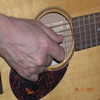Yeah, but remember it was a temporay fix, and he had an audition scheduled.
And I didn't feel like explaining the entire tuning process and coming across as condescending . . . (either that, or I was just being lazy).
And, besides, I'm not getting paid to do this . . .

Also - I didn't think he was going to leave the strings on after the audition . . . I hope not, anyway.
.
Whatever . . .
.
And, anyway, yeah, I do pre-'strech' my strings.
.
Actually, I don't know how much the strings truly
stretch; - what they mostly do is
slip and wrap themselves firmer . . .
The actual stretching may take 2 - 24 hours . . . dunno . . .
.
But most of the immediate tuning problems with new strings can be directly attributed to slippage and settling . . .
What happens is that the strings slip and settle where you've got them wrapped around the pegs, and sometimes you get some slippage down by the other end, where they're pegged.
.
Ok, ok, . . . What the hell; I'll tell you how I tune; free lesson for the
newbies . . .
.
If you've been playing less than 5 years, you might want to read this and try it.
.
Because you WILL save yourself the aggravation of having to re-tune when you're trying to play a song . . .
And - first off: always tune
upwards.
If you're too sharp, then de-tune flat and then tune up. Otherwise you can introduce an area of low tension by the keys, eventually resulting in a
slightly flat note.
You want the same tension by the keys as at the fretboard.
And this process takes only about 1/5 of a second longer, per string . . .
.
I've notice that a LOT of guitarists don't have a clue when one of their strings is a tad sharp or flat. They don't even notice.
But I notice . . .
And a lot of guitarists don't even
care if one of their strings is a tad sharp or flat. It's "close enough" or "good enough" for them.
Let me tell you, my friends, 'good enough' is NOT the same as good.
If you're going to do a thing:
do it right the first time.
.
Ok, end of tantrum.

.
.
TUNING:
Thread your new strings, and tune them.
I tune each string 1/2 a tad sharp (in this case, a 'tad' is a barely noticable amount).
.
Then, using one fingertip, I push down on each string to bring it into tune.
.
Then, again using
just one fingertip, I push down on each string, making it too flat, and then immediately tighten and re-tune it.
If you can't make it flat by pushing down, - you're good to go; - go onto the next string.
Repeat with the next string, and the next.
I do
not pull up on the string, because I want it to seat firmly, and pulling up partially unseats it. . . . you lose the friction you were establishing by tuning up . . .
Also, by pulling upwards on a string, you can
not be entirely sure how much force you're putting on the string.
By pushing down with just one fingertip, you know exactly how much force you are applying.
.
You can pull up if you want, but I advise pushing
down; - your choice. Do what you want, I don't care . . .
But, that's how I do it.
.
Ok, so now my guitar with the new strings is in tune.
Next, I bang out about 10 chords, hitting them pretty hard (or fingerpick a bar of a song) to re-tighten any loose spots in my wrapping job.
.
I check the tuning, and press down and re-tune as necessariy.
. . . and bang out another 10 chords, and check again.
.
I repeat the process until the tuning has settled. Usually in 5 minutes it's fairly rock-solid.
Fairly, but
not 100% . . .
.
.
So, ok, this took me an extra 25 minutes, just now, to type all that.
. . . hope someone appreciates it.
But it's a sure bet to save anyone who uses this process a lot of aggravation when performing with new strings,
.
Oh, by the way, I use this same process with my bass, but I use the flat of my finger to press down, instead of the tip.
A bass guitar is a
lot different - they tune quite rapidly, and tend to stay in better tune than a guitar.
.
Yeah, that took a WHOLE lot longer to say than my original response . . .
. . . hope it was worth it to someone . . .






